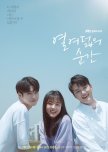This review may contain spoilers
Spoilers Ahead
It took me sometime getting used to At Eighteen’s measured tenor. Dramas set at high school are always about its students and they can be realistically depicted, like in School 2013, or be playful, like Reply 1997, or be wonderfully eccentric, like Extraordinary You. But what all these dramas have in common is a sense of vitality, either through animated characters or a taut plot. Compared to this, At Eighteen’s overall air felt very precise, very poised, tranquil even.
A quick look at the drama’s Asianwiki page told me that it was written by Yoon Kyung Ah, who also wrote Girls’ Generation 1979, which I had concluded in my review as ‘It can sometimes feels very carefully crafted and creaseless compared to a spontaneity that is associated with stories about teenagers’.
At Eighteen, I would also say, is very much in the same vein.The drama is a reflection of its leading man, Choi Joon Woo (a wonderfully restrained Ong Seong Wu), a passive, non-controversial figure, who at first, is just going through the motions. Joon Woo really does feel like a old soul (with cute puppy eyes) as even Yoo Soo Bin (a wonderful Kim Hyang Gi) jokes and asks him if he is a million years old, and has travelled from the future. He doesn’t make rash decisions and tries to see all sides of a problem. He doesn’t rush to hurt Hwi Young, because he is smart enough to know that Hwi Young’s rich parents will protect him, and even when he gets multiple other opportunities, he decides not to do so. He sees the problem in his relationship with Soo Bin which even his mother doesn’t notice.
So, its fitting that the story ends on Joon Woo, and a change he decided on. The drama has always been about him and how he sees and interprets situations, and that in opposition to how the other characters react.
It could also be a way of looking at and treating students like adults, who despite being told that they are too young to know any better, are constantly burdened with workload and decisions, comparable to an adult. By presenting their story in a temperament we expect of, from stories about adulthood (and not from stories about school or teenagers), it gives a new dimension to the same tale.
Students here are mature, and not in a self serving way, ready to trample on others to succeed, but considerate and understanding of each other. It was lovely to see Yoo Soo Bin openly talk about her romantic relationship with her friends, or how many of Ma Hwi Young’s (also a wonderful Shin Seung Ho) classmates are able to pinpoint his flaw, after a major reveal. If these characters weren’t wearing school uniforms, I would have presumed them to be adults.
In all school dramas, it seems prerequisite to include parents who worry more about their children’s grades than the children themselves and this drama too, is no exception. As much as Soo Bin or Hwi Young’s (Kim Sun Young, Jung Young Joo) mothers try to micromanage their children’s schedule, they are unable to see their situation.
Soo Bin’s mother went to Seoul National University but still has to bow down to Hwi Young’s mother, who did not graduate from a well known university, but is higher up in the social ladder thanks to her husband’s success. But at the same time, Soo Bin’s mother is a successful career woman, who is able to let go of a loveless marriage, but Hwi Young’s mother is trapped in one. As Joon Woo says, they are just eighteen. How do they know if their life is ruined or not? It is too early of a decision and a decision that solely depends on which college you get into, which looking at the adults, doesn’t seem to determine how the rest of your life is going to turn out.
The drama is a captivating watch for the whole run, saving for some instances, such as the sudden death of Joon Woo’s friend, Shin Jung Hoo (Seong Geon Hee), which kind of just comes and goes (I still am unsure if he died in an accident or if he was beaten to death) and Hwang Ro Mi’s (Han Sung Min) sudden interest in Joon Woo, which seemed to come out of nowhere.
Even the big climatic reveal about Hwi Young’s grades, fell flat. I had assumed that Hwi Young was in on it too, as we see him asking his parents to take care of things when one of his plans goes out of control.
A quick look at the drama’s Asianwiki page told me that it was written by Yoon Kyung Ah, who also wrote Girls’ Generation 1979, which I had concluded in my review as ‘It can sometimes feels very carefully crafted and creaseless compared to a spontaneity that is associated with stories about teenagers’.
At Eighteen, I would also say, is very much in the same vein.The drama is a reflection of its leading man, Choi Joon Woo (a wonderfully restrained Ong Seong Wu), a passive, non-controversial figure, who at first, is just going through the motions. Joon Woo really does feel like a old soul (with cute puppy eyes) as even Yoo Soo Bin (a wonderful Kim Hyang Gi) jokes and asks him if he is a million years old, and has travelled from the future. He doesn’t make rash decisions and tries to see all sides of a problem. He doesn’t rush to hurt Hwi Young, because he is smart enough to know that Hwi Young’s rich parents will protect him, and even when he gets multiple other opportunities, he decides not to do so. He sees the problem in his relationship with Soo Bin which even his mother doesn’t notice.
So, its fitting that the story ends on Joon Woo, and a change he decided on. The drama has always been about him and how he sees and interprets situations, and that in opposition to how the other characters react.
It could also be a way of looking at and treating students like adults, who despite being told that they are too young to know any better, are constantly burdened with workload and decisions, comparable to an adult. By presenting their story in a temperament we expect of, from stories about adulthood (and not from stories about school or teenagers), it gives a new dimension to the same tale.
Students here are mature, and not in a self serving way, ready to trample on others to succeed, but considerate and understanding of each other. It was lovely to see Yoo Soo Bin openly talk about her romantic relationship with her friends, or how many of Ma Hwi Young’s (also a wonderful Shin Seung Ho) classmates are able to pinpoint his flaw, after a major reveal. If these characters weren’t wearing school uniforms, I would have presumed them to be adults.
In all school dramas, it seems prerequisite to include parents who worry more about their children’s grades than the children themselves and this drama too, is no exception. As much as Soo Bin or Hwi Young’s (Kim Sun Young, Jung Young Joo) mothers try to micromanage their children’s schedule, they are unable to see their situation.
Soo Bin’s mother went to Seoul National University but still has to bow down to Hwi Young’s mother, who did not graduate from a well known university, but is higher up in the social ladder thanks to her husband’s success. But at the same time, Soo Bin’s mother is a successful career woman, who is able to let go of a loveless marriage, but Hwi Young’s mother is trapped in one. As Joon Woo says, they are just eighteen. How do they know if their life is ruined or not? It is too early of a decision and a decision that solely depends on which college you get into, which looking at the adults, doesn’t seem to determine how the rest of your life is going to turn out.
The drama is a captivating watch for the whole run, saving for some instances, such as the sudden death of Joon Woo’s friend, Shin Jung Hoo (Seong Geon Hee), which kind of just comes and goes (I still am unsure if he died in an accident or if he was beaten to death) and Hwang Ro Mi’s (Han Sung Min) sudden interest in Joon Woo, which seemed to come out of nowhere.
Even the big climatic reveal about Hwi Young’s grades, fell flat. I had assumed that Hwi Young was in on it too, as we see him asking his parents to take care of things when one of his plans goes out of control.
Was this review helpful to you?

























